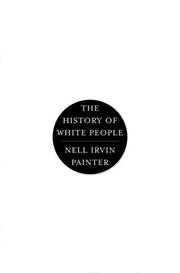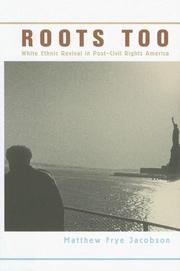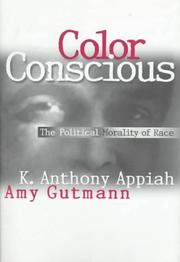| Listing 1 - 10 of 194 | << page >> |
Sort by
|

ISBN: 9781136064265 1299479480 1136064265 9780203616802 0203616804 9780415935722 0415935725 9780415935739 0415935733 9781136064340 9781136064425 1136064346 9781299479487 Year: 2005 Publisher: New York, N.Y.
Abstract | Keywords | Export | Availability | Bookmark
 Loading...
Loading...Choose an application
- Reference Manager
- EndNote
- RefWorks (Direct export to RefWorks)
'Being White' explores what the author calls 'everyday whiteness,' that is, whiteness as lived by everyday experience. This volume aims to shed light on a rarely studied or discussed topic.
Whites --- Youth --- Race awareness --- Race identity --- Attitudes. --- White persons --- Ethnology --- Caucasian race --- White people
Book
ISBN: 025205086X 9780252050862 9780252042119 9780252083822 0252042115 0252083822 Year: 2019 Publisher: Urbana, Illinois
Abstract | Keywords | Export | Availability | Bookmark
 Loading...
Loading...Choose an application
- Reference Manager
- EndNote
- RefWorks (Direct export to RefWorks)
"Until recently, the study of American ethnic history focused almost entirely on groups who fought for legitimacy, operating under the premise that those with uncontested whiteness required no further study. Yet, just as it is vital to study the history of groups who fought to identify as white, so too is it essential to investigate the process by which those who achieved racial hegemony were able to do so. Scandinavians in Chicago explores ideological, gendered concepts of Nordic whiteness and Scandinavian ethnicity employed by native-born Americans in Chicago during the late nineteenth and early twentieth centuries to construct societal hegemony. The focus of this book advances a more comprehensive understanding of the Scandinavian-American experience by examining the process by which Nordics became the embodiment of whiteness and thus were granted racial privilege. This study's intention is to help bridge the gap in our understandings of white racial identity by analyzing the history of those who benefitted most for a social constructed hierarchy of race in America. As evidenced in the election cycle of 2016, America is a country staunchly divided by economic background, ideological positioning, political beliefs, and racial difference, as well as in our understandings of those differences and how we got to where we are today"--
Scandinavian Americans --- Whites --- White people --- White persons --- Ethnology --- Caucasian race --- Scandinavians --- Race identity
Book
ISBN: 1940939496 1940939488 9781940939490 9781940939483 Year: 2016 Publisher: New York, New York : 2Leaf Press,
Abstract | Keywords | Export | Availability | Bookmark
 Loading...
Loading...Choose an application
- Reference Manager
- EndNote
- RefWorks (Direct export to RefWorks)
Whites --- Race identity --- White persons --- Ethnology --- Caucasian race --- White people --- United States --- Race relations.

ISBN: 9780393339741 0393339742 9780393049343 Year: 2011 Publisher: New York, N.Y. W.W. Norton & Company
Abstract | Keywords | Export | Availability | Bookmark
 Loading...
Loading...Choose an application
- Reference Manager
- EndNote
- RefWorks (Direct export to RefWorks)
Traces the idea of a white race, showing how the origins of the American identity were tied to the elevation of white skin as the embodiment of beauty, power, and intelligence, and how even intellectuals insisted that only Anglo Saxons were truly American.
Whites --- History. --- Race identity --- United States --- Race relations. --- White people --- White persons --- History --- Race question --- Ethnology --- Caucasian race --- World history
Book
ISBN: 1282103377 9786612103377 0253002885 9780253002884 9781282103375 9780253318138 9780253220714 0253220718 0253318130 661210337X Year: 2009 Publisher: Bloomington : Indiana University Press,
Abstract | Keywords | Export | Availability | Bookmark
 Loading...
Loading...Choose an application
- Reference Manager
- EndNote
- RefWorks (Direct export to RefWorks)
Habits of Whiteness offers a new way to talk about race and racism by focusing on racial habits and how to change them. According to Terrance MacMullan, the concept of racial whiteness has undermined attempts to create a truly democratic society in the United States. By getting to the core of the racism that lives on in unrecognized habits, MacMullan argues clearly and charitably for white folk to recognize the distance between their color-blind ideals and their actual behavior. Revitalizing the work of W. E. B. Du Bois and John Dewey, MacMullan shows how it is possible to reconstruct racial habits and close the gap between people. This forthright and persuasive analysis of the impulses of whiteness ultimately reorganizes them into something more compatible with our country's increasingly multicultural heritage.
Race awareness --- Whites --- Awareness --- Ethnopsychology --- Ethnic attitudes --- White people --- White persons --- Ethnology --- Caucasian race --- History. --- Race identity
Book
ISBN: 1921666145 1921666153 9781921666155 9781921666148 Year: 2010 Publisher: ANU Press
Abstract | Keywords | Export | Availability | Bookmark
 Loading...
Loading...Choose an application
- Reference Manager
- EndNote
- RefWorks (Direct export to RefWorks)
What did the future hold for Rhodesia's white population at the end of a bloody armed conflict fought against settler colonialism? Would there be a place for them in newly independent Zimbabwe? Pioneers, Settlers, Aliens, Exiles sets out the terms offered by Robert Mugabe in 1980 to whites who opted to stay in the country they thought of as their home. The book traces over the next two decades their changing relationship with the country when the post-colonial government revised its symbolic and geographical landscape and reworked codes of membership. Particular attention is paid to colonial memories and white interpellation in the official account of the nation's rebirth and indigene discourses, in view of which their attachment to the place shifted and weakened. As the book describes the whites' trajectory from privileged citizens to persons of disputed membership and contested belonging, it provides valuable background information with regard to the land and governance crises that engulfed Zimbabwe at the start of the twenty-first century.
White people --- White persons --- Decolonization --- Whites --- Zimbabwe --- Politics and government --- Race relations. --- Ethnology --- Caucasian race --- Sovereignty --- Autonomy and independence movements --- Colonization --- Postcolonialism
Book
ISBN: 9781779221698 177922169X 9781920499976 1920499970 9786613660626 1779221967 1779331959 1779221975 1280683686 9781779221971 9781779331953 9781280683688 9781924099974 9781924099976 6613660620 9781779221964 Year: 2012 Publisher: Harare, Zimbabwe : Weaver Press,
Abstract | Keywords | Export | Availability | Bookmark
 Loading...
Loading...Choose an application
- Reference Manager
- EndNote
- RefWorks (Direct export to RefWorks)
The history of colonial land alienation, the grievances fuelling the liberation war, and post-independence land reforms have all been grist to the mill of recent scholarship on Zimbabwe. Yet for all that the countryís white farmers have received considerable attention from academics and journalists, the fact that they have always played a dynamic role in cataloguing and representing their own affairs has gone unremarked. It is this crucial dimension that Rory Pilossof explores in The Unbearable Whiteness of Being. His examination of farmersí voices ñ in The Farmer magazine, in memoirs, and in
Whites --- Farmers --- Farmers. --- Race relations. --- Whites. --- History. --- Zimbabwe --- Zimbabwe. --- White people --- White persons --- Ethnology --- Caucasian race --- Farm operators --- Operators, Farm --- Planters (Persons) --- Agriculturists --- Rural population

ISBN: 0585119724 9780585119724 9780817384524 0817384529 9780817303280 0817303286 9780817304584 0817304584 0817303286 0817304584 Year: 1988 Publisher: University, Ala. University of Alabama Press
Abstract | Keywords | Export | Availability | Bookmark
 Loading...
Loading...Choose an application
- Reference Manager
- EndNote
- RefWorks (Direct export to RefWorks)
Cracker Culture is a provocative study of social life in the Old South that probes the origin of cultural differences between the South and the North throughout American history. Among Scotch-Irish settlers the term "Cracker" initially designated a person who boasted, but in American usage the word has come to designate poor whites. McWhiney uses the term to define culture rather than to signify an economic condition. Although all poor whites were Crackers, not all Crackers were poor whites; both, however, were Southerners. The author insists that Southerners and North

ISBN: 0674039068 9780674039063 0674027434 9780674027435 0674018982 9780674018983 Year: 2006 Publisher: Cambridge, MA : Harvard University Press,
Abstract | Keywords | Export | Availability | Bookmark
 Loading...
Loading...Choose an application
- Reference Manager
- EndNote
- RefWorks (Direct export to RefWorks)
In the 1970's, white ethnics mobilized around a new version of the epic tale of plucky immigrants making their way in the New World through the sweat of their brow. Although this turn to ethnicity was for many an individual search for familial and psychological identity, Roots Too establishes a broader white social and political consensus arising in response to the political language of the Civil Rights movement.
Whites --- Ethnicity --- White people --- White persons --- Ethnology --- Caucasian race --- Ethnic identity. --- Sociology of minorities --- National movements --- United States --- United States of America

ISBN: 1400810833 1282753126 9786612753121 1400822092 9781400810833 9781400822096 9780691026619 0691026610 0691059098 9780691059099 1400800080 1400814944 9781282753129 6612753129 Year: 1998 Publisher: Princeton, NJ
Abstract | Keywords | Export | Availability | Bookmark
 Loading...
Loading...Choose an application
- Reference Manager
- EndNote
- RefWorks (Direct export to RefWorks)
In America today, the problem of achieving racial justice--whether through "color-blind" policies or through affirmative action--provokes more noisy name-calling than fruitful deliberation. In Color Conscious, K. Anthony Appiah and Amy Gutmann, two eminent moral and political philosophers, seek to clear the ground for a discussion of the place of race in politics and in our moral lives. Provocative and insightful, their essays tackle different aspects of the question of racial justice; together they provide a compelling response to our nation's most vexing problem. Appiah begins by establishing the problematic nature of the idea of race. He draws on the scholarly consensus that "race" has no legitimate biological basis, exploring the history of its invention as a social category and showing how the concept has been used to explain differences among groups of people by mistakenly attributing various "essences" to them. Appiah argues that, while people of color may still need to gather together, in the face of racism, under the banner of race, they need also to balance carefully the calls of race against the many other dimensions of individual identity; and he suggests, finally, what this might mean for our political life. Gutmann examines alternative political responses to racial injustice. She argues that American politics cannot be fair to all citizens by being color blind because American society is not color blind. Fairness, not color blindness, is a fundamental principle of justice. Whether policies should be color-conscious, class conscious, or both in particular situations, depends on an open-minded assessment of their fairness. Exploring timely issues of university admissions, corporate hiring, and political representation, Gutmann develops a moral perspective that supports a commitment to constitutional democracy. Appiah and Gutmann write candidly and carefully, presenting many-faceted interpretations of a host of controversial issues. Rather than supplying simple answers to complex questions, they offer to citizens of every color principled starting points for the ongoing national discussions about race.
Whites --- African Americans --- Racism --- Race awareness --- Negritude --- Race identity --- Race identity. --- Ethnic identity --- United States --- Race relations. --- Race question --- White persons --- Ethnology --- Caucasian race --- White people
| Listing 1 - 10 of 194 | << page >> |
Sort by
|

 Search
Search Feedback
Feedback About UniCat
About UniCat  Help
Help News
News